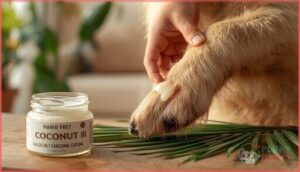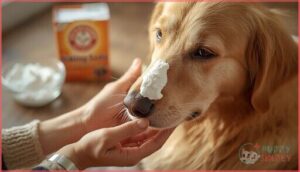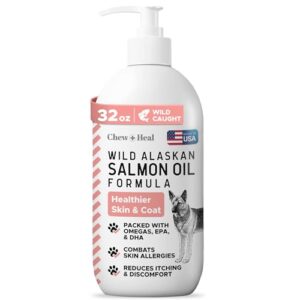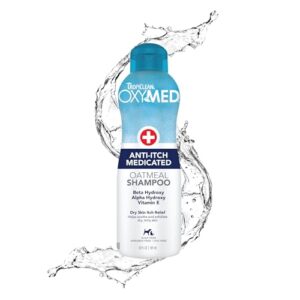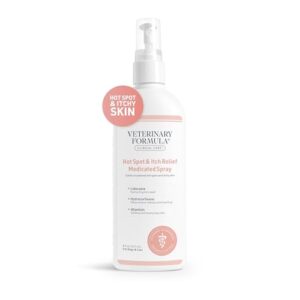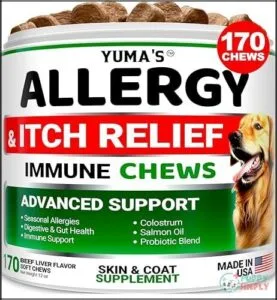This site is supported by our readers. We may earn a commission, at no cost to you, if you purchase through links.

Your dog’s constant scratching isn’t just annoying—it’s a sign something’s wrong. Maybe it’s the 2 AM paw-licking sessions that wake you up, or the way she drags her belly across the carpet like she’s trying to put out a fire. I see this every single day in my clinic, and here’s what most pet parents don’t realize: about 70% of itchy dogs have one of five fixable problems.
The good news? You don’t always need expensive vet visits or prescription medications to help. Many effective dog itching remedies start right in your kitchen or medicine cabinet. From oatmeal baths that actually calm inflamed skin to dietary tweaks that eliminate triggers, you’ve got more power than you think to give your pup relief.
Table Of Contents
- Key Takeaways
- Common Causes of Dog Itching
- Effective Home Remedies for Itchy Dogs
- Dietary Changes to Reduce Itching
- Top Products for Dog Itching Relief
- Preventing Future Itchy Skin Episodes
- When to Seek Veterinary Help
- Frequently Asked Questions (FAQs)
- What can I give my Dog for itchy skin?
- How to medicate a dog with itchy skin?
- How do I get my Dog to stop itching?
- How to treat dog skin rashes & itchy skin?
- What is the best home remedy for dogs itching?
- How do you treat itchy skin on dogs?
- Does Dawn dish soap help itchy dogs?
- How do I stop the itching?
- How do you treat a dog’s Itchy paws?
- Can stress or anxiety cause itching in dogs?
- Conclusion
Key Takeaways
- About 70% of itchy dogs have one of five fixable problems—fleas, food allergies, environmental allergens, skin infections, or dry skin—and identifying the root cause is essential before starting any treatment.
- Effective home remedies like colloidal oatmeal baths, coconut oil applications, and omega-3 fatty acid supplements can provide real relief for mild to moderate itching without expensive vet visits or prescriptions.
- Prevention through regular grooming, consistent flea control, washing bedding weekly, and tracking your dog’s diet can stop itching episodes before they start and reduce long-term skin issues.
- Seek immediate veterinary help if your dog shows severe symptoms like difficulty breathing, blue gums, collapse, or if DIY treatments worsen the condition—some situations require professional diagnosis and prescription medications.
Common Causes of Dog Itching
Your dog’s nonstop scratching usually has a root cause—and pinpointing it’s half the battle. From tiny pests hitching a ride on their fur to invisible allergens floating through your home, the culprits vary widely.
Gentle relief often starts with switching to dog shampoos formulated for sensitive skin that calm inflammation without harsh chemicals.
Let’s break down the most common offenders so you know what you’re dealing with.
Fleas and Parasites
Fleas are the usual suspects behind your dog’s relentless scratching. These tiny bloodsuckers complete their lifecycle in just 3 to 6 weeks, multiplying fast in warm conditions.
Ticks and mange mites join the parasite party too. Year-round flea prevention is your best defense—it stops itch relief struggles before they start.
Regular flea control and pest management beat dealing with infestations later. For even more details on zoonotic disease risks and parasite prevention, consult resources from veterinary experts.
Food Allergies and Sensitivities
Sometimes the culprit isn’t crawling on your dog—it’s inside the food bowl. Food intolerance and dog allergies to proteins like beef, chicken, or wheat trigger skin inflammation that shows up as persistent itching.
Allergy testing and elimination diets help pinpoint dietary triggers. Your vet might recommend nutritional therapy with novel proteins or limited-ingredient formulas as natural remedies for pets, giving relief where flea treatments can’t.
Environmental Allergens
Your dog’s itchy skin might be triggered by invisible invaders floating through the air. Pollen exposure from trees, grasses, and weeds causes seasonal flares—especially during spring and fall when outdoor triggers peak.
Indoor culprits like dust mites, mold growth, and poor air quality add fuel to the fire, turning dog allergies into year-round misery.
Common environmental allergens that trigger skin allergies:
- Pollen from trees, grasses, and weeds – peaks in early morning and windy days
- House dust mites – thrive in warm bedding, carpets, and upholstery
- Mold and mildew spores – flourish in damp basements and bathrooms
- Cockroach debris – urine and body parts contain potent allergens
- Animal dander and saliva – proteins linger on furniture after grooming
Canine dermatology experts recommend identifying specific triggers through veterinary advice before starting any allergy treatment plan. For more information on the diagnosis of environmental allergies, consult a trusted healthcare resource.
Skin Infections (Bacterial and Fungal)
Beyond pollen and dust, bacterial infections and fungal treatments become necessary when skin lesions appear. Hot spots ooze and spread fast—Staphylococcus bacteria love irritated skin. Ringworm creates circular bald patches, while yeast infections cause brownish, smelly inflammation in skin folds and paws.
Infection control starts with early detection. Antifungal medications and proper canine dermatology care stop these dog skin conditions before they spiral.
Dry Skin and Irritants
Winter months and central heating strip natural oils from your dog’s coat, leaving behind flaky, uncomfortable patches. Dry air in your home drops skin humidity below 40 percent, worsening itchy skin and skin irritation exponentially.
Common dry skin triggers include:
- Hot water baths that remove essential lipids from the skin barrier
- Harsh shampoos with sulfates causing lipid restoration problems
- Low indoor humidity control during heating season
- Irritant removal failure—detergents and cleaners linger on surfaces
- Prolonged sun or wind exposure disrupting the protective skin layer
Skin moisturizers containing colloidal oatmeal or coconut oil restore balance. Dry air solutions like humidifiers maintain 40-60 percent humidity, while switching to hypoallergenic products prevents contact dermatitis before it starts.
Effective Home Remedies for Itchy Dogs
When your dog’s scratching becomes relentless, you don’t always need to rush to the vet or break out prescription medications right away. Your kitchen and bathroom cabinets likely hold several gentle, effective remedies that can bring relief within hours.
Here are six vet-approved home treatments that actually work to calm irritated skin and stop the itch cycle.
Colloidal Oatmeal Baths
Think of colloidal oatmeal as nature’s itch eraser. These finely ground oats create a milky bath packed with beta-glucans and proteins that lock moisture into your dog’s skin.
They build barrier function while soothing raw, irritated patches. For safe application, use lukewarm water and soak for 5-10 minutes.
You’ll notice itch relief within hours—no harsh chemicals needed.
Chamomile and Green Tea Soaks
Two gentle herbal remedies pack a serious anti-inflammatory punch for itchy skin. Chamomile soothes irritation, while green tea’s tannins and polyphenols support healing. Brew both teas, cool to lukewarm, then apply as a rinse to problem spots.
The calming aroma doubles as natural aromatherapy during treatment. These tea combinations offer skin calming relief without harsh chemicals—perfect for sensitive pups needing gentle dog skin care.
Apple Cider Vinegar Sprays
Apple cider vinegar sprays balance your dog’s skin pH and deliver mild antimicrobial action against surface bacteria. Many formulas add aloe or chamomile for extra soothing power. This natural remedy works best for mild irritation, not severe allergies.
Mix a 50-50 blend with water, then spray onto itchy skin—avoiding eyes, nose, and open wounds. Always patch-test first and watch for redness.
Coconut Oil Applications
Think of coconut oil as your dog’s go-to moisturizer when dry patches spark a scratch fest. This topical relief creates a protective barrier repair layer while delivering serious skin hydration through medium-chain triglycerides.
Massage a thin coat onto itchy spots, let it work for 10-15 minutes, then wipe away excess. Cold-pressed virgin coconut oil works best for natural remedies that tackle dog itching without harsh chemicals.
Aloe Vera Gel Treatments
Aloe vera benefits extend beyond human skincare—this cooling gel delivers instant itch relief when your pup can’t stop scratching. Apply pure aloe vera (no additives) directly to irritated patches for skin hydration that calms inflammation fast.
The gel creates a protective film over itchy skin, supporting natural healing while addressing skin allergies. Just watch your dog doesn’t lick it off before it works its magic.
Baking Soda Paste
Mix three parts baking soda with one part water for a thick paste that targets localized itchy skin. This gentle application works fast on bug bites and hot spots—dab it on, wait a few minutes, then rinse.
It’s one of the simplest home remedies for dog itching, offering itch reduction without harsh chemicals or expensive products.
Dietary Changes to Reduce Itching
What your dog eats matters more than you might think regarding itchy skin. Food sensitivities, missing nutrients, and inflammation from the gut can all show up as scratching and irritation.
Here’s how simple dietary tweaks can make a real difference in your dog’s comfort.
Elimination Diets for Allergies
Struggling with pet allergies? An elimination diet is your detective tool for skin allergies. You’ll remove common culprits—beef, dairy, wheat—then introduce a novel protein your dog’s never had. This restricted feeding trial lasts 4 to 6 weeks.
Watch for allergic reactions. If itching fades, you’ve found the trigger. Proper diet formulation requires patience, but allergy testing through food trial methods delivers real answers for canine health and wellness.
Limited-Ingredient Dog Foods
Once you’ve identified food triggers, limited ingredient diets keep dog skin calm. These simplified formulas feature a single source protein—like venison or kangaroo—paired with one carbohydrate. Here’s what makes them work:
- Novel proteins reduce cross-reactivity from previous foods
- Five to eight ingredients total (no hidden fillers)
- Grain free options available for sensitive stomachs
- AAFCO-approved for complete canine health and pet nutrition
Clean labels mean fewer flare-ups.
Omega-3 Fatty Acid Supplements
Fish oil transforms inflamed dog skin from the inside out. Omega-3 fatty acid supplements deliver EPA and DHA—powerful anti-inflammatories that calm skin allergies and restore coat shine.
Most dogs need 100–300 mg of combined EPA/DHA per kilogram of body weight daily for itch relief. Choose third-party tested fish or krill oil in liquid or chew forms. Results improve canine health after several consistent weeks.
Probiotics for Skin Health
Your dog’s gut health directly shapes their skin health through the gut-skin axis. Probiotics reduce inflammation from within, boosting ceramide production to strengthen the skin barrier and lock in moisture.
Probiotics strengthen your dog’s skin barrier from the inside out by reducing gut inflammation and boosting moisture-locking ceramides
Daily probiotic chews or yogurt supplements support the skin microbiome, calming itchiness in mild eczema cases. Look for formulas targeting canine dermatology with live cultures—gentle natural remedies that complement fish oil beautifully.
Ensuring Proper Hydration
Often overlooked, hydration levels powerfully influence skin elasticity and overall coat health. Proper fluid balance keeps your dog’s skin supple, reducing dryness that triggers scratching fits.
Boost water intake with these dog health tips:
- Offer fresh water constantly—aim for 1 ounce per pound of body weight daily
- Add low-sodium broth to meals for electrolyte management
- Pair hydration with coconut oil topically for double skin health support
Top Products for Dog Itching Relief
Sometimes home remedies aren’t enough, and that’s when the right product can make all the difference. I’ve seen countless dogs find relief with veterinary-recommended supplements, shampoos, and topical treatments designed specifically for itchy skin.
Here are four vet-approved products that consistently deliver results for my patients.
1. Alaskan Salmon Oil for Dogs
Wild Alaskan salmon oil works like a shield for your dog’s skin—delivering EPA and DHA directly where they’re needed. The anti-inflammatory fatty acids rebuild the skin barrier, making fur shinier and reducing that frantic scratching.
You’ll pump it over meals daily, watching dandruff and itchy patches fade over weeks. Refrigerate after opening to keep it fresh.
Most owners notice less flaking within two weeks, though severe cases need patience and consistency to heal completely.
| Best For | Dog owners dealing with dry, itchy skin, dandruff, or dull coats who want a natural omega-3 boost without artificial additives. |
|---|---|
| Primary Use | Skin & coat health |
| Brand | Chew + Heal Labs |
| Form | Oil |
| Target Animals | Dogs |
| Vet Status | Professional-grade |
| Free From | Additives/preservatives |
| Additional Features |
|
- Pure wild Alaskan salmon and pollock oil with no preservatives or fillers
- Pump dispenser makes daily dosing simple and mess-free
- Noticeable improvements in skin and coat health within two weeks for most dogs
- Requires refrigeration after opening, which limits portability
- No clear guidance on interactions with other supplements or medications
- Results vary by individual dog, and severe skin issues may take longer to resolve
2. TropiClean Itch Relief Shampoo
When dry, irritated skin turns bath time into a battle, this medicated oatmeal shampoo changes everything. TropiClean’s formula combines colloidal oatmeal, beta hydroxy acid, and tea tree oil—ingredients that soothe inflammation while gently exfoliating clogged pores.
You’ll massage it in for 3-5 minutes, letting the botanical blend work its magic. The coconut cleanser lifts debris without stripping natural oils, perfect for dogs 12 weeks and older.
It’s soap-free, paraben-free, and gentle enough for frequent use. Most owners report softer coats and visible itch relief after just a few washes.
| Best For | Dogs with dry, itchy skin, allergies, or dandruff who need gentle relief without harsh chemicals. |
|---|---|
| Primary Use | Itch relief |
| Brand | TropiClean |
| Form | Shampoo |
| Target Animals | Cats and dogs |
| Vet Status | Vet recommended |
| Free From | Soap/paraben/dye |
| Additional Features |
|
- Fast-acting formula with oatmeal and tea tree oil calms irritation and inflammation quickly
- Safe for frequent use with soap-free, paraben-free ingredients that won’t strip natural oils
- Works on multiple issues at once—itching, shedding, dandruff, and dry skin
- Higher price point at $17.99 compared to basic pet shampoos
- Results vary by pet—may not solve severe skin conditions or all allergy types
- Requires 3-5 minute massage application, which takes longer than quick rinse shampoos
3. Hot Spot Itch Relief Spray
When hot spots flare up, you need relief fast—this Veterinary Formula spray delivers. It combines lidocaine for instant itch relief with hydrocortisone to calm inflammation and redness. Spray directly on affected areas 1-3 times daily until the spot is wet but not dripping.
The formula includes allantoin to support healing and benzethonium chloride for antibacterial protection. It’s safe for dogs over 12 weeks, paraben-free, and works between baths. Just keep your pup from licking until it dries completely.
| Best For | Pet owners looking for quick relief when their dog develops itchy hot spots, especially if the issues come from allergies or bug bites. |
|---|---|
| Primary Use | Itch & hot spot relief |
| Brand | Veterinary Formula |
| Form | Spray |
| Target Animals | Cats and dogs |
| Vet Status | Vet recommended |
| Free From | Paraben/dye/allergen |
| Additional Features |
|
- Works fast with lidocaine to stop itching right away while hydrocortisone calms the redness
- Easy spray application that you can use between baths without needing to rinse
- Includes antibacterial protection to help prevent infection while hot spots heal
- Won’t fix severe raw patches on its own—you’ll likely need other treatments too
- Some dogs might lick it off before it dries, reducing effectiveness
- Quality can be inconsistent, with occasional reports of counterfeit or damaged bottles
4. Dog Allergy Itch Relief Chews
If your dog’s itching stems from allergies, daily chews can tackle the root cause. YUMA’S Allergy Relief Chews pack omega-3s, probiotics, and immune-supporting vitamins into beef liver-flavored treats dogs actually want to eat.
Give them based on your pup’s weight—one to three chews daily. The 170-count jar lasts up to two months and works for all ages and sizes.
You’ll see reduced paw licking, fewer hot spots, and healthier skin within a few weeks of consistent use.
| Best For | Dogs with ongoing environmental, food, or seasonal allergies that cause constant itching, paw licking, and skin irritation. |
|---|---|
| Primary Use | Allergy & itch relief |
| Brand | YUMA’S |
| Form | Chews |
| Target Animals | Dogs |
| Vet Status | Veterinarian-formulated |
| Free From | Codfish |
| Additional Features |
|
- Combines omega-3s, probiotics, and immune-supporting vitamins in one daily chew
- Works for all dog sizes and ages with a beef liver flavor most dogs like
- Up to 2-month supply (170 chews) makes it cost-effective for long-term allergy management
- Some dogs may refuse the taste or texture of the chews
- Can cause loose stool at the recommended dosage in certain dogs
- Contains simple carbs like dextrose and potato starch, plus a 60-day shelf life after opening
Preventing Future Itchy Skin Episodes
Once you’ve tackled your dog’s current itching, the real key is stopping it from coming back. Prevention isn’t complicated—it’s about building simple routines that keep your dog’s skin healthy and allergens at bay.
Here’s what actually works to cut down those scratchy episodes for good.
Regular Grooming and Bathing
Consistent grooming does more than keep your dog looking sharp—it prevents itchy skin before it starts. Brushing techniques that reach the skin help distribute natural oils and remove allergens.
Bathing schedules every 4 to 6 weeks with a pH-balanced shampoo maintain cleanliness without stripping moisture. During each session, conduct a thorough skin inspection to catch early signs of trouble.
Flea and Tick Prevention
Parasites top the list of itch triggers, so flea and tick prevention comes first. Monthly topical spot-ons kill fleas and ticks on contact for about 30 days. Oral chewables offer systemic protection lasting one to three months. Collars release active ingredients over several months—perfect if your dog hates topicals. Always follow label directions to avoid overdosing or reactions.
Cleaning Dog Bedding and Environment
Your dog’s bed collects allergens, bacteria, and dander—all irritants that worsen itching. Bedding hygiene and fabric selection matter for pet care. Follow these sanitization methods and cleaning schedules for odor control:
- Wash removable covers weekly using hot water and pet-friendly detergent.
- Vacuum the bed area twice weekly to reduce pollen transfer.
- Rotate between two beds so each gets thorough cleaning.
- Blot fresh spills immediately with enzymatic cleaner.
- Choose machine-washable covers that tolerate high heat.
Monitoring Diet and Allergens
Spotting patterns in canine skin allergies often starts with a Food Diary and Allergen Tracking. Jot down every snack, meal, and treat, along with itching episodes. Adjust Dietary Changes slowly—one new protein at a time.
Hydration Management matters too; fresh water promotes skin health. These Dog Health Tips help you pinpoint triggers and keep your pup’s Animal Nutrition and Diet on track.
Routine Skin Checks
Check your dog’s skin head to toe during each grooming session. Inspect ears, paw pads, and belly folds for hidden irritation. Document any new bumps or changes in coat condition—note size, color, and location.
Seasonal shifts or new cleaning products can trigger flare-ups. If you spot persistent redness or non-healing sores, schedule a veterinary visit right away.
When to Seek Veterinary Help
Home remedies work wonders for mild itching, but sometimes your dog needs more than oatmeal baths and coconut oil. Knowing when to pick up the phone and call your vet can mean the difference between a quick fix and a serious health problem.
Let’s walk through the red flags that signal it’s time for professional help.
Signs It’s Time to Call The Vet
Sometimes itchy skin turns into an emergency. If your dog shows signs like difficulty breathing, severe lethargy, or acute vomiting alongside itching, that’s your cue for an immediate vet visit.
Pet health alerts include:
- Blue or pale gums with labored breathing signal oxygen deprivation
- Collapse or inability to stand suggests shock or serious underlying conditions
- Blood in vomit or diarrhea lasting over 12 hours requires urgent symptoms evaluation
Trust your instincts—when canine distress escalates beyond simple itchy skin, veterinary advice becomes critical for emergency care.
Risks of DIY Treatments
Well-intentioned home remedies can backfire fast. Poor infection control during DIY treatments introduces bacteria into open wounds, while incorrect concentrations cause skin damage that worsens dog itching instead of providing itchy skin relief.
Allergic reactions to common ingredients like essential oils create unexpected swelling, and misuse risks include chemical burns from overexposure.
Treatment ineffectiveness wastes time when veterinary advice could resolve skin inflammation quickly.
Monitoring for Worsening Symptoms
Your symptom tracking becomes detective work when dog itching doesn’t improve. Record itch intensity daily on a 0-10 scale, noting whether skin lesions expand or new dermatitis patches appear. Watch for behavioral shifts like increased restlessness or self-harm licking that signal worsening skin inflammation.
Health logging helps you spot patterns—maybe itchy skin flares after certain meals or outdoor exposure—giving your vet concrete data for faster skin conditions diagnosis.
Safe Use of Medications and Topicals
Topical creams and medications for dog skin require veterinary consultations before you start—mixing products without guidance risks medication interactions that worsen itchy skin. Apply only to intact skin unless your vet says otherwise, follow dosage control exactly, and never share human treatments with pets.
Pet safety guidelines matter most: call your vet if redness spreads or skin conditions deteriorate despite proper use.
Frequently Asked Questions (FAQs)
What can I give my Dog for itchy skin?
Wondering what’ll stop that constant scratching? Try colloidal oatmeal baths, coconut oil, or aloe vera as natural remedies.
Skin supplements with omega-3s support canine nutrition, while relief treatments target itchy skin using home remedies.
How to medicate a dog with itchy skin?
Your vet may prescribe antihistamines, oclacitinib, or cyclosporine to reduce immune-driven itch. Injectable therapy like Cytopoint blocks itchy signals for 4-8 weeks.
Short steroid courses treat severe inflammation, while antibiotic courses target bacterial infections.
How do I get my Dog to stop itching?
The secret to stopping relentless scratching? Act fast, but think long-term. Identify triggers first—fleas, food, or environmental allergens.
Soothe itchy skin immediately with natural remedies for dogs like oatmeal baths.
Maintain a consistent routine and monitor progress carefully.
How to treat dog skin rashes & itchy skin?
Treating dog skin rashes and itchy skin starts with gentle colloidal oatmeal baths, aloe vera gel for cooling relief, and omega-3 supplements to support skin health.
While identifying underlying causes like allergies or infections, these measures provide immediate comfort and promote healing.
What is the best home remedy for dogs itching?
Here’s something interesting: the timing of when you catch your dog’s itch matters as much as what you use.
For mild itching, colloidal oatmeal baths work best—they’re safe, soothing, and vet-recommended for reducing inflammation naturally.
How do you treat itchy skin on dogs?
You need a layered approach: start with gentle oatmeal baths for itch relief, add omega-3s for skin health, and use natural remedies like coconut oil.
Always tackle the root cause—fleas, allergies, or infections.
Does Dawn dish soap help itchy dogs?
Many pet owners reach for Dawn, hoping it’ll soothe their dog’s itching, but dish soap actually strips natural oils and disrupts dog skin pH, often worsening itchy skin rather than relieving it.
How do I stop the itching?
You can stop the itching with vet-approved itch relief methods like colloidal oatmeal baths, apple cider vinegar sprays, and omega-3 supplements—plus addressing root causes like allergies or fleas.
How do you treat a dog’s Itchy paws?
A lukewarm colloidal oatmeal bath works wonders for inflamed paw pads. Soak each paw for five minutes, then gently dry between toes. Follow with coconut oil to lock in moisture and soothe irritation.
Can stress or anxiety cause itching in dogs?
Yes. Anxiety triggers compulsive licking and scratching, creating an itch cycle. Stress hormones weaken skin immunity, while changes in routine heighten the emotional scratch reflex—making canine stressors a real contributor to dog itching.
Conclusion
An ounce of prevention is worth a pound of cure”—but when your dog’s already scratching holes in their skin, you need action now. The dog itching remedies we’ve covered give you real options, from oatmeal baths to omega-3s.
Start with the simplest solutions first. Track what works. And remember: persistent itching deserves a vet’s eyes. Your dog’s comfort isn’t something to gamble with—it’s something you can actually fix.
- https://www.avma.org/resources-tools/pet-owners/petcare/skin-allergies
- https://www.sciencedirect.com/science/article/abs/pii/S0195561614001879
- https://www.spandidos-publications.com/ijmm/26/6/935
- https://www.merckvetmanual.com/dog-owners/skin-disorders-of-dogs/itching-pruritus-in-dogs
- https://vcahospitals.com/know-your-pet/inhalant-allergies-atopy-in-dogs





